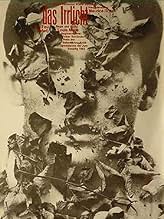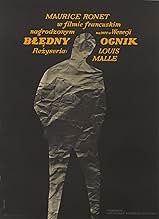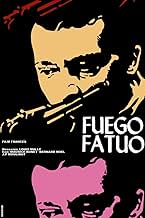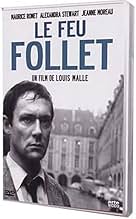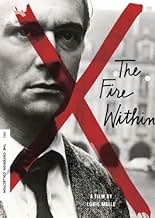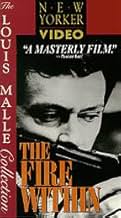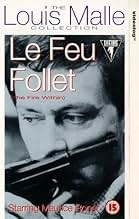CALIFICACIÓN DE IMDb
7.8/10
11 k
TU CALIFICACIÓN
El deprimido Alain Leroy abandona la clínica donde se ha desintoxicado. Se reúne con amigos, conocidos y mujeres, intentando encontrar un motivo para seguir viviendo. ¿Le ayudará esto?El deprimido Alain Leroy abandona la clínica donde se ha desintoxicado. Se reúne con amigos, conocidos y mujeres, intentando encontrar un motivo para seguir viviendo. ¿Le ayudará esto?El deprimido Alain Leroy abandona la clínica donde se ha desintoxicado. Se reúne con amigos, conocidos y mujeres, intentando encontrar un motivo para seguir viviendo. ¿Le ayudará esto?
- Dirección
- Guionistas
- Elenco
- Premios
- 2 premios ganados y 2 nominaciones en total
René Dupuy
- Charlie
- (as René Dupuis)
- Director
- Guionistas
- Todo el elenco y el equipo
- Producción, taquilla y más en IMDbPro
Opiniones destacadas
Wonderful study of the last day in the life of a man. This movie has one specific scene where Alan Leroy (Maurice Ronet), sitting at a cafe in Paris, takes his first alcoholic drink after months of rehabilitation. This scene is complimented by stunning photography of Chislain Cloquet and the haunting music of Eric Satie. Malle captures the true meaning of existentialist philosophy and manages to create a movie that does not wallow in self-pity but instead celebrates our ability to choose whether to live or die.
A bleak character study of a recovering alcoholic who has lost all hope and decides to kill himself. The film follows him over the course of a couple of days as he wanders about the streets, running into and saying goodbye to former acquaintances. One senses that he's trying out of a last ditch sense of desperation to tease out of these people some hint of how they manage to find things worth living for, but their secrets remain elusive. He carries out his plan, and the film makes the rather unsettling suggestion that some never find anything worth living for.
Not a comforting thought for those who struggle through depressions of their own and look to the positive messages so often found in films to buoy their hopes. But then this movie is not intended to be comforting. It's quiet, lonely, and depressing, but it's also a bit refreshing that director Louis Malle resists a happy resolution and instead stays committed to depicting life the way it actually plays out for some rather than the way the movies would have us believe it does.
Grade: A
Not a comforting thought for those who struggle through depressions of their own and look to the positive messages so often found in films to buoy their hopes. But then this movie is not intended to be comforting. It's quiet, lonely, and depressing, but it's also a bit refreshing that director Louis Malle resists a happy resolution and instead stays committed to depicting life the way it actually plays out for some rather than the way the movies would have us believe it does.
Grade: A
"The Fire Within" (French, 1963): Directed by Louis Malle, scored by Eric Satie. This is a perfect visual reason to use black and white with tons of gray. It is two days in the life of a young, popular man who has returned to his acquaintances, friends and ex-lovers, after vanishing into a program for alcoholics
a program he found comforting, and did NOT want to leave. He searches through his relationships for a reason to continue his life, whether as-is or anew
but overriding any thoughts of the future is his current state of total depression. His friends continued their lives during his absence, they continue their fast-paced, challenging repartee during his visits, and they will clearly continue after his leaving. "The Fire Within" is a quiet, observational film, interrupted only for conversations that seem to have substance, yet offer no solutions. It has one goal, and meets it very well.
THE FIRE WITHIN is a drama about a former alcoholic, who is at the crossroads between life and death in a state of a deep depression. It is based on the novel "Will O' the Wisp" by Pierre Drieu La Rochelle.
Alain, a recovering alcoholic at a rehabilitation clinic in Versailles suffers with a depression. He often thinks about suicide, but still tries to find some valid reasons for living. He is in complete contrast with a behavior of his friends, which further enhances his internal conflict...
Mr. Malle gently touches sore points of a depressed man. His hero is empty and defeated man, who is trapped between a drunken past and an uncertain future. Many of the protagonists, who are full of compassion and love, going through his frustrating life. He's a lost soul, who can not let go of his depressive everyday life. However, a man, without an imagination and love, must find his own peace and certainty. A recovery from alcohol is an ironic view of a collapsed life.
Regardless of a state of his mind and heart, his tragic appearance is not quite clear. This is a kind of flaw of this film, because the main protagonist has condemned himself to a tragic end, before he has considered any options. An authentic scenery emphasizes his escape from any opportunities in life.
Maurice Ronet as Alain Leroy has offered a convincing performance. He is a lonely man who helplessly wanders...search, and then run away from love and certainty.
Life is a kind of agony in this case.
Alain, a recovering alcoholic at a rehabilitation clinic in Versailles suffers with a depression. He often thinks about suicide, but still tries to find some valid reasons for living. He is in complete contrast with a behavior of his friends, which further enhances his internal conflict...
Mr. Malle gently touches sore points of a depressed man. His hero is empty and defeated man, who is trapped between a drunken past and an uncertain future. Many of the protagonists, who are full of compassion and love, going through his frustrating life. He's a lost soul, who can not let go of his depressive everyday life. However, a man, without an imagination and love, must find his own peace and certainty. A recovery from alcohol is an ironic view of a collapsed life.
Regardless of a state of his mind and heart, his tragic appearance is not quite clear. This is a kind of flaw of this film, because the main protagonist has condemned himself to a tragic end, before he has considered any options. An authentic scenery emphasizes his escape from any opportunities in life.
Maurice Ronet as Alain Leroy has offered a convincing performance. He is a lonely man who helplessly wanders...search, and then run away from love and certainty.
Life is a kind of agony in this case.
THE FIRE WITHIN chronicles the last chapter in the life of a failed writer who is locked in a struggle with existential despair. Alain Leroy is presently in a hospice undergoing treatment for alcoholism, and he is clearly hung-up on the same dilemma that perplexed Shakespeare's Hamlet-should he continue with his lackluster existence, or end the hopelessness of it all? Always the ladies man, he now feels that he was never able to touch or connect with any of the passions of his nature, and alcohol allowed him a safe haven while he awaited his real life to commence. But, it never did. He spends his last few days visiting with old friends trying to uncover an answer to his problem, but finds no solace in their warmth and encouragement. The film follows the premise to the logical conclusion, but whether we were watching the buildup to a suicide was really not the prime concern of the movie. Malle's film succeeds in that he is able to present a three dimensional character at a significant crossroads in his life. Also, the film contains many wonderful scenes of Paris street life from the early 1960's which further increases the richness of this movie.
¿Sabías que…?
- TriviaFor the first two days, filming was done in color. However, director Louis Malle realized that this was a distraction from the story, so he decided to film in black-and-white. An assistant also later declared that the shooting atmosphere on the set was rather gloomy.
- ErroresAs Alain walks on the streets of Paris, the crew (pushing the dolly) is visible on the shop windows he passes by.
- Citas
Alain Leroy: I'm killing myself because you didn't love me, because I didn't love you. Because our ties were loose, I'm killing myself to tighten them. I leave you with an indelible stain.
- Bandas sonorasTrois Gymnopédies
Written by Erik Satie
Selecciones populares
Inicia sesión para calificar y agrega a la lista de videos para obtener recomendaciones personalizadas
- How long is The Fire Within?Con tecnología de Alexa
Detalles
- Fecha de lanzamiento
- País de origen
- Sitio oficial
- Idioma
- También se conoce como
- The Fire Within
- Locaciones de filmación
- Productora
- Ver más créditos de la compañía en IMDbPro
- Tiempo de ejecución1 hora 48 minutos
- Color
- Mezcla de sonido
- Relación de aspecto
- 1.66 : 1
Contribuir a esta página
Sugiere una edición o agrega el contenido que falta

Principales brechas de datos
By what name was Fuego fatuo (1963) officially released in India in English?
Responda
![Ver Bande-annonce [OV]](https://m.media-amazon.com/images/M/MV5BODdiNzczOTktMmMxMC00ZGQ0LTg4YWItZWEzN2FkZTViODk1XkEyXkFqcGdeQXRyYW5zY29kZS13b3JrZmxvdw@@._V1_QL75_UY281_CR0)
